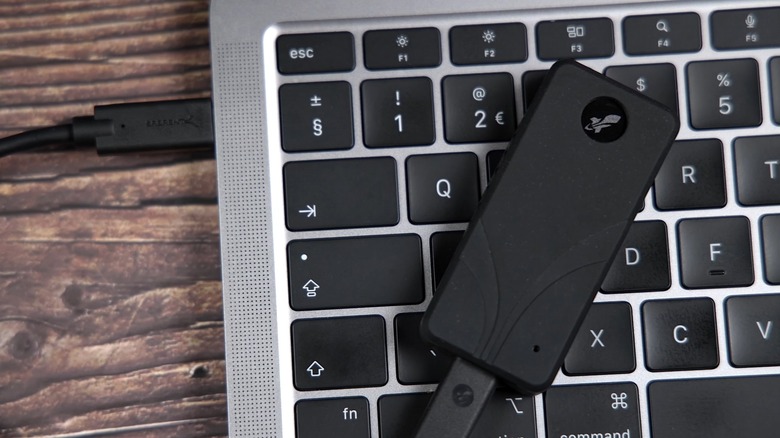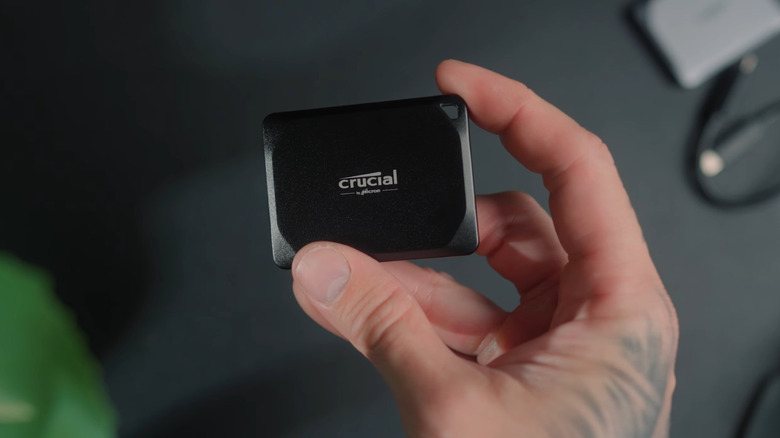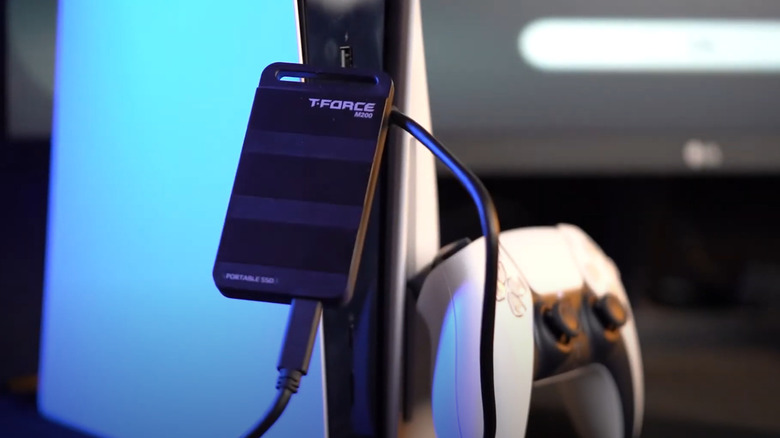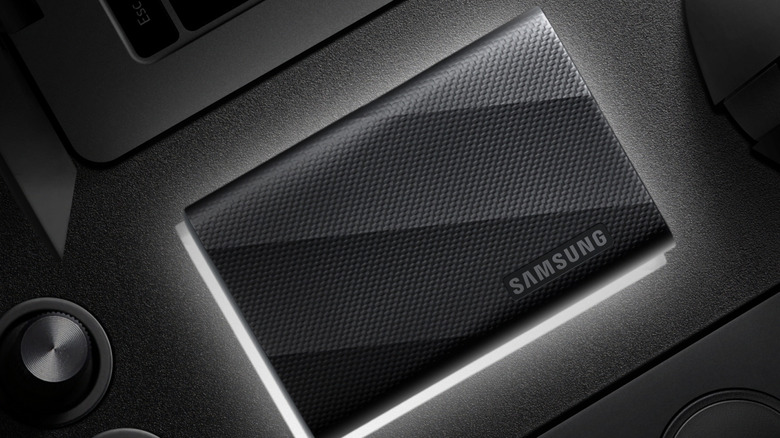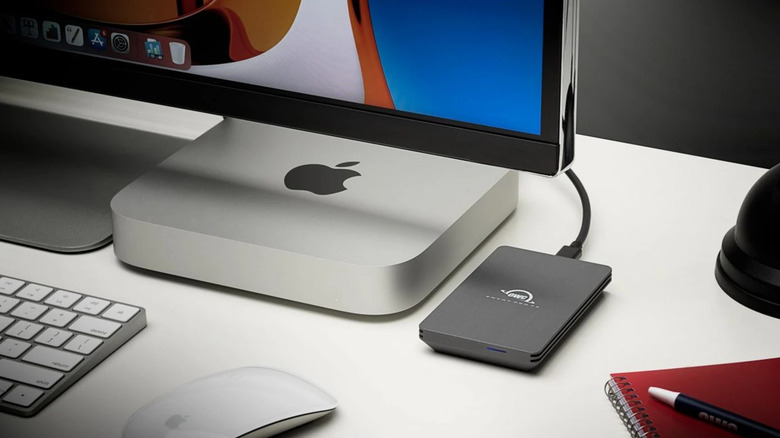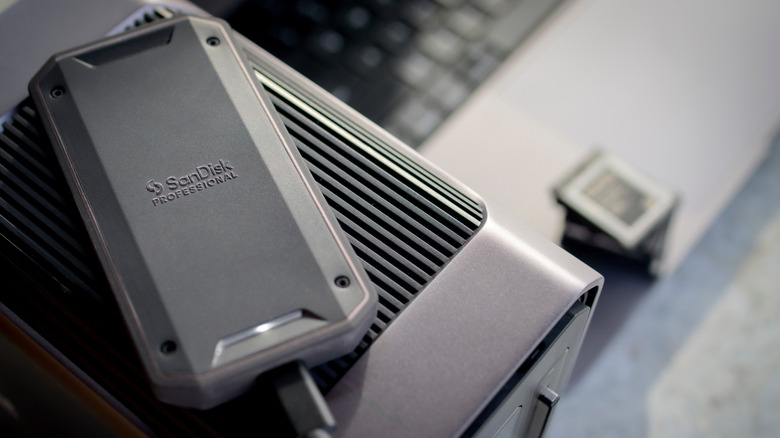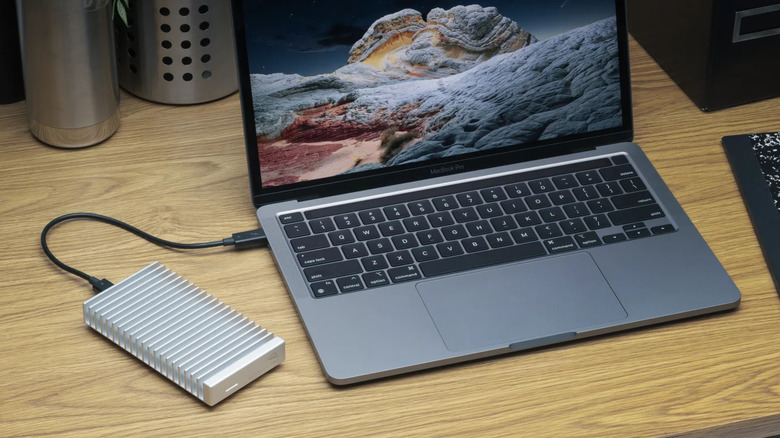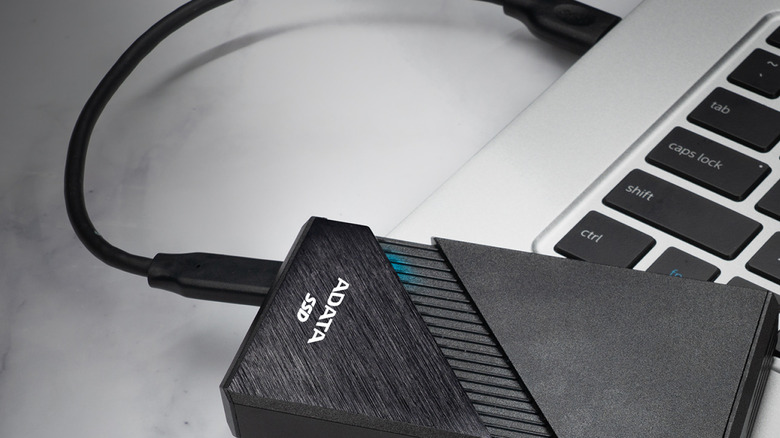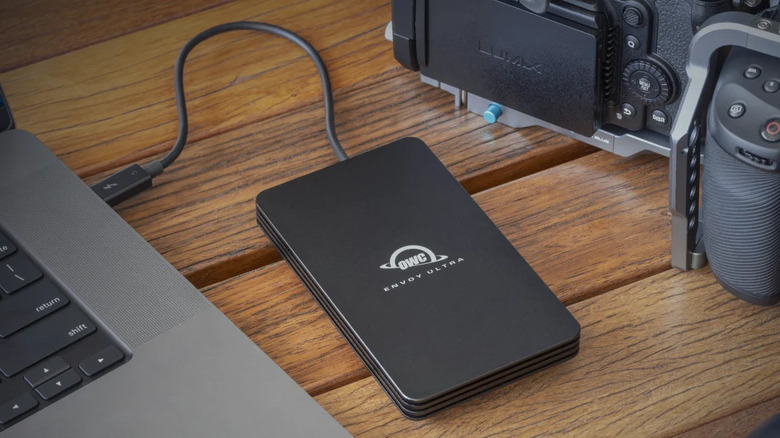10 Of The Fastest Portable SSDs You Can Buy
We may receive a commission on purchases made from links.
Portable storage has improved in leaps and bounds since the days of the humble floppy disk. File sizes have grown immensely over the years — Windows 11 demands 64 GB of hard drive space, while Windows 95 only needed 35 MB — and so portable storage has had to keep up with this ever-increasing demand for hard drive space.
The portable solid state drive (SSD) first came to market in the mid 2010s from brands like Glyph, Samsung, and Western Digital. These early portable SSDs weren't as capacious as their mechanical cousins — WD's My Passport external hard drives offered up to 3 TB of storage, whereas the My Passport SSD topped out at 1 TB — but they made up for it by doubling the transfer rate. They were also more expensive, but that's the price you had to pay for performance.
In the decade or so since those early portable SSDs, we've seen them grow in size — you can now get 8 TB portable SSDs, which should be more than enough for all but the most dedicated data hoarders — and speed, with the fastest portable SSDs now running rings around their mechanical cousins thanks to new standards like USB 4 and Thunderbolt 4. Speed isn't the only criterion to consider when shopping for a portable SSD, of course, but if you're looking for speedy storage above all else, read on. We've ordered this list of 10 based on transfer rates listed in megabytes per second (MB/s)
Sabrent Rocket Nano V2
Sabrent's Rocket Nano V2 stands out from the rest of the speedy SSD crowd for its form factor, looking more like a USB thumb drive than a high-capacity portable SSD. This USB 3.2 Gen 2x2 SSD isn't the fastest one out there, even compared to its Gen 2x2 peers, but those who need something more pocketable than usual would do well to check it out.
Now, this isn't to say that the Rocket Nano V2 is slow, mind you. The company claims sequential transfer speeds of more than 1,500 MB/s when connected to a USB 20 Gbps port, which is likely more than fast enough for most end-users. It's a somewhat conservative claim compared to most other companies, many of which focus on how well their external SSDs can saturate a particular USB standard. To Sabrent's credit, though, it is a target that the Rocket Nano V2 easily lives up to.
PCWorld put a 4 TB model through its paces and measured sequential read and write speeds of 1,698 MB/s and 1,520 MB/s, respectively, in CrystalDiskMark 8. Not the fastest 20 Gbps SSD to ever go through the outlet's testing, but no slouch, either — and all in a compact form factor that may just compensate for the relative lack of speed compared to other USB 3.2 Gen 2x2 SSDs.
LaCie Rugged Mini SSD
Seagate-owned LaCie has been in the storage business for decades, having been founded in 1987. The company is likely best known for its product designs, and the LaCie Rugged Mini SSD certainly carries on the tradition with its distinctive bright orange bumper.
As the name suggests, LaCie's SSD is at home in the great outdoors, with IP54 water and dust resistance, and allegedly the ability to withstand nearly 10-foot drops and 1.1 tons of crushing pressure from a car. This durability doesn't come at the cost of raw speed, either, although it's definitely not quite as fast as some other USB 3.2 Gen 2x2 portable SSDs.
Seagate claims read speeds of up to 2,000 MB/s, and real-world testing bears this out at least: PCMag managed 1,980 MB/s in a CrystalDiskMark test. Write speeds weren't as great at 1,737 MB/s, but that's still not bad and well within touching distance of other Gen 2x2 SSDs. LaCie also sells the Rugged SSD Pro, a Thunderbolt 3 version with a theoretical max transfer speed of 2,800 MB/s.
Crucial X10 Pro
Many USB 3.2 Gen 2x2 portable SSDs perform similarly, and while the Crucial X10 Pro doesn't really stand out from the crowd in terms of raw throughput, its ability to sustain good transfer speeds means it's worth including in this list.
Of course, the fact that the X10 Pro isn't an outstanding performer in terms of sequential read and write doesn't mean that it's a slow SSD. As you may expect, the X10 Pro maxes out at around 2,000 MB/s on paper. The real-world results come close enough, too: PCMag recorded a sequential read speed of 1,977 MB/s, with write speeds at 1,738 MB/s. The latter result means it's one of the slower-writing USB 3.2 Gen 2x2 drives on this list, but it's still more than fast enough for most users.
The X10 Pro comes up big in sustained write tests, to: Tom's Hardware tested a 2 TB model and noted that the drive hovered between 1,750 and 1,780 MB/s writes for around 11 minutes, which was much longer than the other drives in the outlet's testing — even a pricey (and much faster) Thunderbolt 3 SSD. So while raw speed may not be the X10's forte, it's likely the fastest SSD out there when writing huge chunks of data in one go.
Teamgroup T-Force M200
Transfer rates are great, but they're not the be-all-end-all when it comes to portable SSDs (or storage in general, really). Value plays a big part in the purchasing decision, with price per terabyte all-important if you don't have a ton of cash to burn — especially considering how volatile SSD prices can be. The Teamgroup T-Force M200 external SSD manages to satisfy both criteria though, ranking as one of the fastest portable SSDs available while also coming in at prices lower than the competition — albeit with one notable catch.
Let's discuss the good stuff first. Teamgroup states that the M200 can fully utilize USB 3.2 Gen 2x2's 20 Gbps bandwidth, achieving transfer rates of up to 2,000 MB/s. PCWorld's testing backs the company's claims up, with the outlet's CrystalDiskMark 8 tests showing read and write speeds of 1,910 and 2,026 MB/s, respectively. Sure, it falls slightly short of 2,000 MB/s in the read tests, but we reckon 1,910 MB/s will be close enough for most.
There is one issue, though: The M200's write speed falls off a cliff once you exhaust the write cache. PCWorld measured a low of 164 MB/s once the M200 ran out of cache, which is particularly slow. It's probably not the best choice for those who regularly move numerous huge files in one go. If you only ever move smaller files — or you just need a portable SSD to migrate your Steam library to — then that minor drawback likely won't matter much.
Samsung T9
Many rank Samsung as one of the best SSD brands currently operating, if not the best brand, and SSDs like the T9 are a perfect example of why. The Samsung T9 may be one of the pricier USB 3.2 Gen 2x2 portable SSDs on the market at the time of writing, but it's hard to argue against its performance.
As with any USB 3.2 Gen 2x2 SSD, Samsung claims theoretical maximum sequential read and write speeds of 2,000 MB/s. The T9 comes as close to maxing out the protocol as SSDs will likely get, hitting 1,982 and 1,891 MB/s read and write speeds, respectively, in PCMag's CrystalDiskMark tests. Interestingly, unlike other USB 3.2 Gen 2x2 SSDS, the T9 didn't fall back to USB 3.2 Gen 2 speeds when connected to a Thunderbolt port, with the outlet measuring 2,357 and 1,938 MB/s read and write where other similarly-specced SSDs dropped to around 1,000 MB/s.
These numbers are mostly comparable to Teamgroup's much cheaper M200, but the T9 has one major advantage: it doesn't slow down as much once you exhaust the write cache, still writing files at 890 MB/s off cache in PCWorld's testing. Most users likely won't ever end up in that situation, but it's good to know that the T9 will still be relatively fine even if it runs out of write cache.
OWC Envoy Pro FX
Now we start getting into the really fast drives. OWC's first SSD on this list, the OWC Envoy Pro FX, is a Thunderbolt 3- and USB 3.2 Gen 2-compatible external SSD that takes advantage of the former to offer some very impressive transfer speeds.
The Envoy Pro FX is, according to OWC, capable of maxing out Thunderbolt 3's 2,800 MB/s bandwidth, but real-world tests show that the Envoy Pro FX can do a bit more than that: PCWorld managed around 3,040 MB/s for reads and 2,983 MB/s for writes, exceeding OWC's claims. The Envoy Pro FX was no slouch when connected via USB-C — which isn't the same as Thunderbolt, despite the identical connector — either, coming close to USB 3.2 Gen 2's theoretical maximum throughput with 1,083 and 1,081 MB/s reads and writes, respectively. So it's going to be a speedy drive, no matter the protocol.
OWC also claims IP67 and MIL-STD810G ratings for the Envoy Pro FX's aluminum case. We're not sure how many of you will benefit from the latter, but water and dust resistance are always great — even if IP67 may be a bit overkill for most users. Better safe than sorry, though, and those who work in the field will appreciate as much protection as they can get.
SanDisk Professional PRO-G40
SanDisk may be best known for making great microSD cards, but the corporation also offers a range of other storage devices — including a very fast portable SSD in the form of the SanDisk Professional PRO-G40.
The PRO-G40 is a Thunderbolt 3 and USB-C-compatible portable SSD with claimed maximum transfer rates of 3,000 MB/s (read) and 2,500 MB/s (write) over the former, dropping to 1,050 MB/s and 1,000 MB/s when connected via the latter — all while staying cool and apparently not throttling thanks to an aluminum heatsink. Like the OWC Envoy Pro FX, PCWorld found that the SanDisk exceeded the manufacturer's claims, with 3,112 MB/s reads and 2,676 MB/s writes in CrystalDiskMark.
USB 3.2 Gen 2 performance was impressive as well, reading data at 1,060 MB/s and writing it at 1,035 MB/s. It did stumble slightly in PCWorld's 450 GB write test when connected via USB, needing nearly 12 minutes compared to the 10-and-a-half of the cheaper Samsung T7, but that's only a minor blip. Besides, we don't expect anyone to pay this much for an SSD only to use it primarily with USB-C, anyway. SanDisk also claims IP68 dust and water resistance, 4,000-pound crush resistance, and the ability to withstand nearly 10-foot drops, so it should hold up fine to the occasional clumsy drop or two.
OWC Express 1M2
The OWC Express 1M2 is one of OWC's many high-speed portable SSDs, although one could argue that it's not quite a portable SSD in the same way the other SSDs on this list are. You see, the Express 1M2 is technically a high-speed portable enclosure for an NVMe SSD. But we're counting it because you can buy one with an SSD included, making it a plug-and-play solution like the others on this list — just one that you can upgrade in the future by swapping in a different NVMe drive.
OWC states that the Express 1M2 can move files at up to 3,151 MB/s when connected via a Thunderbolt 4 (Mac or PC) or USB4 port, with speeds dropping to a much more mundane 990 MB/s over Thunderbolt 3 or 10 Gbps USB-C. PCMag's testing generally backs up OWC's claimed speeds, with 3,032 and 2,931 MB/s sequential reads and writes when tested in CrystalDiskMark.
The outlet also highlighted that the Express 1M2 may suffer from degraded performance in Windows by default, but OWC has an easy solution: if you're using the Express 1M2 (or any other high-speed SSD) with a Windows machine, grab the company's Disk Performance tool to change the OS' default removable storage setting and unlock the drive's full potential. Not the first Windows setting to ruin one's experience, but thankfully an quick fix with OWC's utility.
Adata SE920
The Adata brand might not immediately spring to mind when you think of high-speed portable SSDs, but the Thunderbolt 4- and USB4-compatible Adata SE920 shows that even less-prominent names can produce some high-quality hardware.
Adata claims 3,800 and 3,700 MB/s reads and writes for the SE920 over USB4 — provided you adjust Windows' default removable media policy (a problem that also stymies drives like the OWC Express 1M2). PCWorld's tests didn't quite manage to reach Adata's lofty claims, but 3,088 MB/s reads and 2,975 MB/s writes are still ultra-fast and put the SE920 just ahead of OWC's Express 1M2. Will you feel the difference between the two? Probably not, but faster is faster. The Adata SE920 is also noticeably cheaper, which also helps tilt the situation in its favor.
The SE920 also has a clever — or gimmicky, depending on who you ask — cooling solution, with a built-in fan that you can activate by pressing on the case. This opens up the shroud and gets the fan going, which Adata claims makes the SE920 "10% cooler" than fanless solutions. PCWorld's testing confirmed that the fan helped reduce temperatures in use, although whether the difference will make a huge impact in the long run isn't quite as clear.
OWC Envoy Ultra
OWC has been something of a fixture on this list, but that's because the company makes a lot of really fast portable SSDs. Fast as they are, though, none of the company's other SSDs are quite as speedy as the Envoy Ultra, which — as far as we can tell — is the fastest portable SSD you can get your hands on as of November 2024.
The Envoy Ultra isn't some piddly USB 3.2 Gen 2x2 or Thunderbolt 4 SSD, no. It uses the recently-introduced Thunderbolt 5 protocol, which, according to OWC, should allow it to move files at more than 6,000 MB/s. The Envoy Ultra is also backward-compatible, with the company claiming up to 3,800 MB/s transfers on Thunderbolt 4, more than 3,800 MB/s via USB4, and up to 2,800 MB/s when connected to a Mac Thunderbolt 3 port. And it's not all talk, either: Japanese outlet PC Watch managed 6,056 and 4,213 MB/s sequential reads and writes, respectively, in CrystalDiskMark.
Thunderbolt 4 speeds were up there with the best, too, with sequential reads of 3,846MB/s and sequential writes of 2,936 MB/s. So, yes, it's fast. The Envoy Ultra is also IP66 certified for protection water and dust ingress. This level of performance doesn't come cheap, though: a 4 TB OWC Envoy Ultra will set you back $600 at the time of writing.

